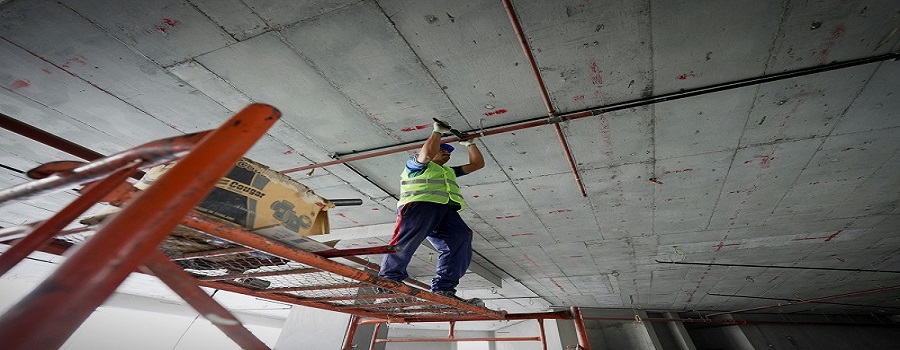Special Offers




Special Offers





Insulation in home construction is a crucial element aimed at regulating temperature and enhancing energy efficiency. Typically installed within walls, ceilings, and floors, insulation acts as a barrier, reducing heat transfer between the interior and exterior. This helps maintain a comfortable living environment while minimizing the need for excessive heating or cooling, thereby lowering energy consumption. Importance of Insulation in Home Construction: Insulation holds paramount importance in home construction in India due to its ability to mitigate extreme weather conditions. In a country with diverse climates, effective insulation helps maintain comfortable indoor temperatures, reducing dependence on energy-intensive heating or cooling systems. This not only enhances living comfort but also contributes significantly to energy conservation. In the long run, well-insulated homes in India lead to lower utility bills, making it an environmentally conscious and economically prudent choice for homeowners. Crucial Considerations for Effective Home Insulation in India In the diverse climate of India, thoughtful insulation is a key aspect of constructing energy-efficient and comfortable homes. Here are essential considerations for effective insulation in home construction: 1. **Climate Analysis:** Before selecting insulation materials, analyze the local climate. Different regions experience varying temperature ranges, and the choice of insulation should align with specific climate needs. 2. **Material Selection:** Opt for insulation materials suitable for the prevailing climate. Common choices include fiberglass, rock wool, and reflective foil insulation. Each material has unique properties, such as thermal resistance and moisture control. 3. **R-Value Awareness:** Understand the R-value, which measures thermal resistance. Higher R-values indicate better insulation. Choose materials with appropriate R-values for different parts of the house, considering factors like walls, roofs, and floors. 4. **Moisture Control:** Address moisture issues to prevent mold and mildew growth. Moisture-resistant insulation materials and proper installation techniques are crucial, especially in humid regions. 5. **Ventilation and Air Sealing:** Ensure adequate ventilation to prevent condensation and improve indoor air quality. Combine insulation with proper air sealing techniques to minimize heat loss or gain through leaks. 6. **Cost-effectiveness:** Balance insulation costs with long-term energy savings. Consider upfront expenses against potential reductions in heating and cooling bills over the lifespan of the home. 7. **Local Regulations and Codes:** Familiarize yourself with local building codes and regulations regarding insulation. Compliance ensures safety and may even lead to potential incentives or certifications. 8. **Sustainable Options:** Explore eco-friendly insulation materials that align with sustainable construction practices. Options like recycled content or natural fibers contribute to environmental responsibility. 9. **Professional Installation:** Engage experienced professionals for insulation installation. Proper installation is crucial for the effectiveness of insulation materials, ensuring they perform optimally. 9. **Professional Installation:** Engage experienced professionals for insulation installation. Proper installation is crucial for the effectiveness of insulation materials, ensuring they perform optimally. 10. **Future Maintenance:** Consider the maintenance requirements of chosen insulation materials. Some materials may degrade over time, and planning for future maintenance ensures long-term efficiency. FAQs for Insulation in Home Construction: 1. **What is the ideal insulation material for homes in hot and humid regions of India?** *Answer:* Reflective foil insulation is often recommended for hot and humid climates in India. It reflects radiant heat, helping to keep interiors cooler and reducing the reliance on air conditioning. 2. **How can I ensure effective insulation against monsoon-related moisture issues?** *Answer:* To address moisture concerns during the monsoon season, consider using moisture-resistant insulation materials and ensure proper ventilation. Adequate air sealing also helps prevent water infiltration. 3. **Are there government incentives or subsidies for incorporating energy-efficient insulation in home construction in India?** *Answer:* Check with local authorities and energy regulatory bodies for potential incentives or subsidies. Some regions offer financial support to encourage energy-efficient practices, including insulation in homes. 4. **What is the recommended R-value for insulation in Indian homes, considering diverse climates?** *Answer:* The recommended R-value can vary based on the specific climate of the region. It's advisable to consult with insulation experts who can assess the local conditions and recommend appropriate R-values for different parts of the house. 5. **Can I retrofit insulation in an existing home, or is it more effective during the initial construction phase?** *Answer:* Retrofitting insulation in an existing home is possible and can significantly improve energy efficiency. While it may involve some challenges, professional installers can assess the feasibility and recommend suitable insulation solutions tailored to existing structures. Conclusion: By addressing these considerations, homeowners in India can create well-insulated spaces that provide comfort, reduce energy consumption, and contribute to sustainable living. Choosing the right insulation strategy tailored to the local climate is a key step toward creating resilient and energy-efficient homes.
Explore the key steps of Home Construction from concept to completion